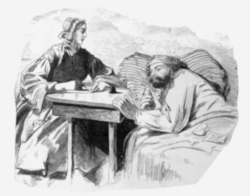One of the hospital duties of all the nurses at the front was writing letters home for the sick and wounded men, and sometimes the sad work of telling the story of their last few hours of life. That such letters helped to comfort sorrowful hearts, the following answer to one shows. The soldier was mortally wounded in the seven days’ fight, and in E’s care on the hospital ship.
To Mrs. Joseph Howland.
July 2nd, 1862.
Madam: Your letter of the z6th ultimo, conveying the mournful intelligence of the death of R. P., was received on Monday, the 30th ult. . . .
Until I received your letter, I had indulged the hope he would survive the injury; and had –not ten minutes before it was delivered to me–been informed by a lady, whose son is in the same division, that he was wounded, and that the other members of the company were preparing to send him home. This information, with a knowledge that he was of a robust constitution, and perfectly healthy, induced the belief he would recover. . . .
Madam, that letter of yours, although it was a messenger of death, when it was received by those who were being tortured by alternating thoughts of hope and fear, was like the visit of an angel; for it relieved their minds of a torturing anxiety.
I am requested by R’s father to let you know that he is utterly unable to express his gratitude; that the only way he feels able to compensate you is by offering his heartfelt thanks.
Madam, the occupation which it appears you have chosen, that of alleviating the condition of those who are in affliction, is for its labor paid in a still secret way, which is not fully appreciated by any, except they be like you; for I doubt not, that on receipt of this, (when you will have known that you have been instrumental in conferring a lasting favor,) a lady of your nature will feel she is somewhat repaid.
